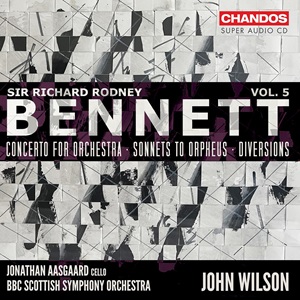
Richard Rodney Bennett (1936-2012)
Orchestral Works Volume 5
Concerto for Orchestra (1973)
Sonnets to Orpheus for cello and orchestra (1978-9)
Diversions (1989)
Jonathan Aasgard (cello)
BBC Scottish Symphony Orchestra/John Wilson
rec. 2023, City Halls, Glasgow, UK
Chandos CHSA5266 SACD [72]
I must admit to being puzzled by the career of Richard Rodney Bennett. In his earlier years he seemed to have the musical world at his feet and looked likely to become a composer of the calibre of his near contemporaries Birtwistle and Maxwell Davies. His first three symphonies and the opera The Mines of Sulphur certainly suggested this. Yet somehow, perhaps after his third symphony, which dates from 1987, the urgency seems to have gone out of his music. His later works are brilliant and entertaining, but seem somewhat occasional, and he spent a great deal of his time writing film music and playing jazz, perfectly respectable activities I concede, but I had thought he was made for greater things.
Here, in the latest of the series John Wilson has been conducting for Chandos, we have two works from his earlier period and one from his later one. The Concerto for Orchestra was written for the Denver Symphony Orchestra, whose conductor said that they had no tradition there for him to be fearful of. Bennett took the opportunity to write a three movement work in an idiom which is bold without being challenging. It suggests to me the Tippett of his middle period. The opening Aubade begins brashly, almost like Copland, but contains a small scherzo and slow movement within. The second movement is slow but with a scherzo middle section. The finale is a set of variations. This is a worthy addition to that twentieth century innovation, concertos for orchestra.
Someone should gently and quietly tell composers that if they write a work for solo instrument and orchestra, if they call it anything other than concerto, they are seriously reducing the prospect of its being programmed. Here Bennett not only does that, but he gives his work the title Sonnets to Orpheus, which is that of one of the German poet Rilke’s most celebrated works. With that title you would expect a song cycle. What you get is a cello concerto, a big work for a concerto, in five movements. Each is prefixed with a line from Rilke, but these appear in the score and the sleeve note and are not said or sung. Having said that, this is a good work. Although it has some of that lyrical writing for the cello which is characteristic of the English pastoral school, it is mainly a tough and sinewy work, well worth getting to know. This is its premiere recording, rather confirming my view that its title has been against it.
Finally, we have Diversions, written for a school orchestra. Here Bennett follows in the tradition of Holst and Britten who also wrote music for young performers. The work is a theme and variations, with the theme drawing on the Scottish folksong ‘Whistle and I’ll come to you, my lad’ – I don’t think Bennett was thinking of M. R. James’s celebrated ghost story here – and two of the variations draw on other folk songs. The whole work is brilliantly varied and entertaining, very much in the Britten manner, while also being, as I suggested at the outset, somewhat lightweight.
The performances under John Wilson are crisp and cogent, as one would expect, and Jonathan Aasgaard is an eloquent soloist in that confusingly named concerto. This is a SACD, but I was listening in ordinary stereo and found the sound up to Chandos’s usual standards. The booklet is informative, while the spine as is normal with Chandos, does not list the works included but only the volume number of the series. Those collecting this series need not hesitate.
Stephen Barber
Buying this recording via a link below generates revenue for MWI, which helps the site remain free


Previous review: Philip Harrison (February 2025)

















